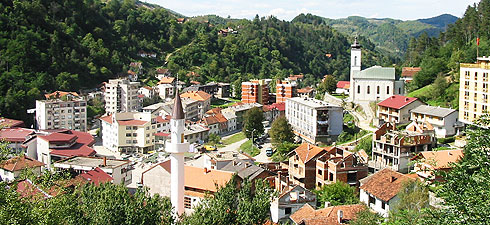"Today, they had some very good ideas," says Dragana Jovanovic. She's talking about a class of young people learning to run their own companies. "We're working with three of them on their business strategies — one is a bee keeper, another is a mechanic, and the third one is a butcher." Jovanovic is the director of Prijatelji Srebrenice (“Friends of Srebrenica”), a multi-ethnic organisation financed by the Netherlands, which hopes to improve the prospects of Srebrenica's young people [In 1995, Dutch forces had been assigned to protect the United Nations "safe area" of Srebrenica when it was overrun by Serbian troops]. Jovanovic's office is located in what used to be the Robna Kuca department store. The facade of the building, which was destroyed by bombardment during the war, has now been restored — and its bright yellow walls add a cheerful touch of colour to the town's main square.
"Over the last few years, many of the buildings have been renovated, but we still have plenty of empty homes." According to Jovanovic, economic problems rather than ethnic tensions are the main obstacle to progress. There is a chronic shortage of jobs for the 10,000 people that live in Srebrenica and its 19 surrounding villages. In that population, which is 60% Serb and 40% Bosnian Muslim, poorly trained young people are hit hardest by unemployment. Now the Friends of Srebrenica foundation, which organises training programmes to teach youngsters how to apply for work or develop a business plan, is hoping to revitalise the local economy. "Srebrenica continues to make headlines for one day a year, but it's only ever mentioned on 11 July. I'd like us to get some attention on other days — and for positive reasons."
Jovanovic is well aware that not everyone shares this point of view. Most Bosnians only think of Srebrenica in the context of the 1995 genocide — and they do not see any future for the town, except as as a setting for remembrance ceremonies. Worse still, any effort to associate Srebrenica with positive news is often construed as an attempt to minimise crimes committed by the Serbs. However, Jovanovic believes that a brighter future could bring change, without overlooking the past. "We have to take into account what happened, if we don't want history to repeat itself." The past should be a subject of discussion, but history that is interpreted on ethnic lines should not be the only focus: "We talk about how much we suffered, but we rarely mention the suffering of others."
She regrets that the region's politicians have not done more to bridge the ethnic divide. Bosnians are often troubled by Serbian politicians who advocate greater autonomy for Republika Srpska, one of the two main political-territorial divisions of the state of Bosnia. On the other side, Serbians are often put on the defensive by politicians in Sarajevo, who raise the issue of a special status for Srebrenica. Jovanovic believes that the impact of this type of talk is amplified by economic uncertainty. "That is why we are attacking the main problems of unemployment and insufficient training."
As she does every year, Jovanovic attended the remembrance service for the thousands of Muslims who were murdered on 11 July, 1995 [6,186 of the 8,000 people who were killed have now been identified]. It is not a question of showing that she is a "good" Serb, but, as she haltingly says "because it is important to recognise what happened."
Was this article useful? If so we are delighted!
It is freely available because we believe that the right to free and independent information is essential for democracy. But this right is not guaranteed forever, and independence comes at a cost. We need your support in order to continue publishing independent, multilingual news for all Europeans.
Discover our subscription offers and their exclusive benefits and become a member of our community now!












